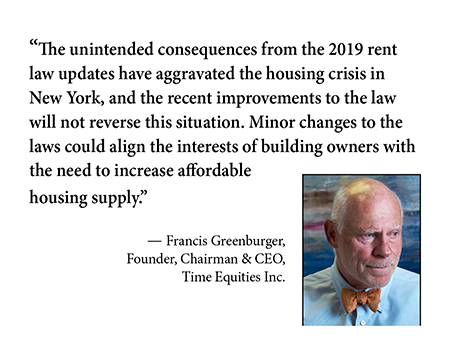By Francis Greenburger, founder, chairman & CEO, Time Equities Inc.
The recent changes to New York laws regarding rent-stabilized apartments, included in the 2024 budget legislation and signed into law by Gov. Kathy Hochul, are a step in the right direction. Unfortunately, the step is so small that the effect will be the same as standing still. Much of the initial commentary on 2024 housing law updates was about the so-called “good cause eviction” provisions, which have little to do with eviction but are instead a rebranding of rent control.
In 2019, the legislature made significant changes to the rules governing rent-stabilized apartments. Most legislators who voted for this bill undoubtedly hoped to help New York State meet its affordable housing needs, but the opposite has happened. Thousands of low-cost, rent-stabilized apartments have since become vacant and remain so.

Many of these apartments were occupied by tenants or families for 40 years or more. Apartments require capital investments periodically, and expectations for housing change dramatically over long periods. Renovating these units to meet modern standards requires significant investment, often mandated by housing code.
Until the changes, building owners were willing to make these investments because they were permitted to increase annual rents by approximately 20 percent of the investment cost. While a 20 percent rent increase may seem generous, the return on investment for building owners was much lower due to various operating costs, including regulatory compliance, repairs, maintenance, management fees, legal expenses and bad debt.
Additionally, New York City’s goal is to target real estate taxes at 35 percent of net revenue. Thus, a 20 percent increase in rental revenue often results in only an 8 to 11 percent increase in profits. This is a reasonable return, akin to the type of return public utilities are often permitted, but not an extraordinarily high return.
Since the 2019 rent law changes, annual stabilized rents can only be increased by 6.67 percent of the investment cost in most cases. The actual return on investment is likely between 3 and 4 percent after accounting for expenses and taxes, which is unattractive compared to other investment options.
Additionally, the 2019 law capped the amount of investment on which a return is permitted for unit renovations at only $15,000. The New York City Housing Authority (NYCHA) has reported spending an average of $375,000 per apartment to renovate vacant units, and requested about $485,000 per apartment for upcoming renovations. This demonstrates how punitive and misguided the 2019 rent law changes were.
The 2024 update to these provisions has increased the amount that can be invested in such apartments to $30,000 in most cases and $50,000 in some situations. It has also raised the allowable rent increase to 7.69 percent of the investment amount per year. While this is an improvement, it remains insufficient to make investing in low-cost, rent-stabilized apartments attractive.
Allowing housing providers to spend about one-tenth as much as New York City itself spends is theoretically better than one-twenty-fifth, but it is still not nearly enough to fix up an apartment. Allowing revenues to increase by 7.69 percent is better than 6.67 percent, but it still means that the building owner can only expect a return on investment of little more than 4 percent. No rational investor would commit to a rent-regulated apartment at a 4 percent return when risk-free U.S. Treasuries are currently offering comparable yields. As such, many units remain vacant under these conditions.
The unintended consequences from the 2019 rent law updates have aggravated the housing crisis in New York, and the recent improvements to the law will not reverse this situation. Minor changes to the laws could align the interests of building owners with the need to increase affordable housing supply.
New York State used to understand that providers of rent-regulated housing were delivering a service similar to a public utility and allowed a fair return on investment. The Public Service Commission in New York has historically permitted returns of about 10 percent on invested equity for regulated utilities. Allowing similar returns to those permitted for utilities could lead to rapid improvements and reintroduction of thousands of apartments to the market, making New York City more attractive and increasing real estate tax revenues to address the city’s challenges and fund its social goals.
Francis Greenburger is an American real estate developer, literary agent, author, art collector, philanthropist and founder of Time Equities Inc., Art Omi Inc. and the Greenburger Center for Social & Criminal Justice. He also serves on the board of several nonprofit organizations and is an active donor to over 300 charitable organizations.


